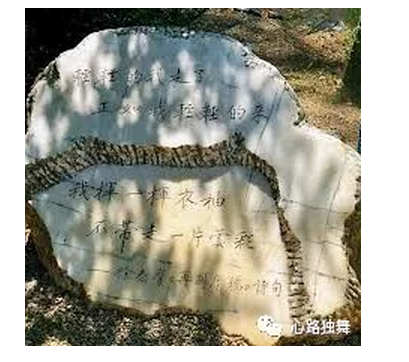阅读:0
听报道
丫丫高中一年级的世界名著赏析荣誉课程中,有一个外国诗歌翻译的大项目,大意的要求是,选择任何一个不会读、说、写的非英语著名诗歌,自己查在线字典翻译之后,在理解原诗的基础上,重新按照美国格式和韵律修改成英文诗歌,同时要求写一篇散文介绍诗歌作者和背景等,可以寻求其他人或者父母的帮助来寻找诗歌、写作背景素材,但是父母和他人不能帮助翻译等事后的工作。最后缴纳的作业包括:翻译好的诗歌、介绍散文、诗歌朗诵(可以请母语的人帮助)、PPT介绍(presentation)。
显然,这个作业考察的是一个孩子的全面能力:寻找帮助、对完全陌生的话题从无知到了解的借助工具能力、对美国诗歌写作的掌握、散文写作能力、归纳和思辨能力、表达能力等等。这是春季上半学期作业的一个重头戏。
我给只会说几句常用中文的丫丫选了《再别康桥》这首诗歌,一是这首诗很美,另外一个原因是这首诗歌和Cambridge(康桥)有点关系,丫丫刚去过英国,对那里喜爱有加,让这首诗歌和她有了某种程度的联系,结果证明这是一个很正确的决定。
下面是丫丫的译诗。
Farewell Cambridge
Author:Xu Zhimo
Gently I am leaving,
As I gently came;
I beckoned out softly,
Farewell to the clouds of the West.
The Golden Willow on the banks of the river,
Is the bride in the sunset;
Her shadows in the waves,
Are ripples in my heart.
The green lilies on the soft mud,
Wave flamboyantly down in the water;
In the soft waves of the Cambridge,
I am willing to become a piece of water grass
The pond under the Willow shade
Not the clear spring,
But the rainbow in the sky
Merged into the floating lilies,
Precipitated into a vivid, vibrant dream.
Dream chasing? Hold on to the long oar,
Dive deeper into the lilies;
Bearinga full ship of starlight,
Sing aloud to the splendid sky.
But I can not sing,
Silence is the flute of parting;
The cricket was quiet for me too,
Silence is tonight's Cambridge!
Gently I am gone,
As I gently came;
I waved down my sleeves,
Do no ttake away a piece of cloud.
由于按规定我不能提供任何帮助,上面明显的翻译失误只好随它存在,不过,对于一个不懂中文的美国孩子来说,能翻译成这个样子我觉得也算达意了。下面是她写的诗歌介绍,我把部分翻译出来,英文同时贴在译文的后面,供有兴趣懂英文的读者阅读。
再别康桥
再别康桥是徐志摩写下的一首著名的中国诗歌,它不仅在中国脍炙人口,而且在世界上很多地区里都很有名气,主要的原因是这首诗歌的开头和结尾的句子篆刻在花岗岩上置放在剑桥大学校园徐志摩纪念花园的入口,这首诗歌在全球的影响力是我选择它的重要原因,尽管隔着语言障碍,这短短29行诗歌对世界的影响力是非常让我惊异的。

借助中英字典的帮助,我对诗歌进行了直译,当然毫无韵律,而且对说英语的人来说晦涩难懂,为了改写,我试图去了解诗歌背后的东西,那就是去了解诗人本身和历史。徐志摩原本在剑桥求学,但是爱上了不能爱的妻子之外的另一个女人林徽因,于是他离开了剑桥回到中国,希望在那里离婚之后回到英国再向林求婚,可惜当他回到剑桥的时候,林已嫁他人,他再度离开剑桥,也是和这里的永别。看到这里,我理解了这首诗歌不仅仅是在向他喜爱的地方告别,更是在向他得不到的女人告别。
*********
后面两段是丫丫对翻译过程中直译、意译和改写的描述,我就不详细翻译了,这个课程研究项目可以给出美国高中一年级学生作业的大概样子,不求标准答案,更注重探索、理解、归纳、思辨和升华,也许这就是能力培养的一个侧面吧。
当然,最后少不了的是标准格式的文献引用。
Translation Project
Farewell Cambridge by Xu Zhimo is a famous Chinese poem that is not just known throughout China but also in many other areas in the world. This is mainly because of Xu Zhimo’s poem, Farewell Cambridge, whichhas its first and last lines carved into granite on the Cambridge campus and entrance to Xu Zhimo’s memorial garden. This global influence is one of the many reasons why I choose this poem. I found it quite remarkable that despite the language barrier one poem, of only 29 lines, was able to make such a huge impact across the world.
Using a Chinese-English dictionary, I was able to complete a direct translation of the poem, which contained no flow nor rhythm, as well as it made minimal sense to an English speaker. In order for me to be able to make alterations to the translation, I had to grasp the overall message behind the poem,ultimately leading me to read about the history of the author. He originally was working in Cambridge when he had fallen in love with a woman named, Lin Huiyin, but he could not marry her due to him already being married to Zhang Youyi. He then left Cambridge and went back to China where he divorced his wife. Hoping to revisit and marry Lin Huiyin, he went back to Cambridge, but only to find out that she had married another man, and he left for the second and last time. Given this knowledge,I have realized the poem was a goodbye not only to the place he loved, Cambridge, but also the woman he could not have.
One of the first and most drastic changes that I had made was the title, which directly translated to “Goodbye Cambridge again.” The reason for changing “goodbye” to “farewell” was because I saw that later in the poem the word farewell was being used. I decided to only choose one of those words to use so that the title could connect with the rest of the poem. “Farewell” was chosen over “goodbye” merely because it holds a more heartfelt connotation. I also did not include the word “again” in the title because if I did then his parting with Cambridge would seem routine, leaving the reader with a possibility that he returned back for the third time. "Farewell Cambridge,” is to leave an impression to the reader that this is Xu Zhimo’s final goodbye, making the author’s agony and pain that he feels of leaving more evident. A similar change was also made in the last stanza, when instead of the word “quietly” being used repeatedly I had altered it to “gently.” This change was also so that the first stanza could reflect itself in the last, allowing the reader to better understand the poem’s meaning.
One of the most significant lines that I did not change was “The Golden Willow on the banks of the river.” The reason for doing this is because the line as it is gives the reader specific Cambridge imagery, as “the Golden Willow” is a type of tree seen on the banks of the Cambridge River. It is crucial for the reader to understand this reference because it makes it apparent that the next three stanzas are also referring to the Cambridge river. Although this line went unchanged, it also played a role in the alteration of another. Later in the fourth stanza, I changed “elm shade” to “willow shade.” This alteration is so that the stanzas couldconnect with each other, and make it more understandable to the reader that stanzas two through five are lines to supply descriptive imagery of the Cambridge River.
Works cited (资料引用)
Zhimo,Xu. “再别康桥.”新月, December 10, 1928.
话题:
0
推荐
财新博客版权声明:财新博客所发布文章及图片之版权属博主本人及/或相关权利人所有,未经博主及/或相关权利人单独授权,任何网站、平面媒体不得予以转载。财新网对相关媒体的网站信息内容转载授权并不包括财新博客的文章及图片。博客文章均为作者个人观点,不代表财新网的立场和观点。




 京公网安备 11010502034662号
京公网安备 11010502034662号 